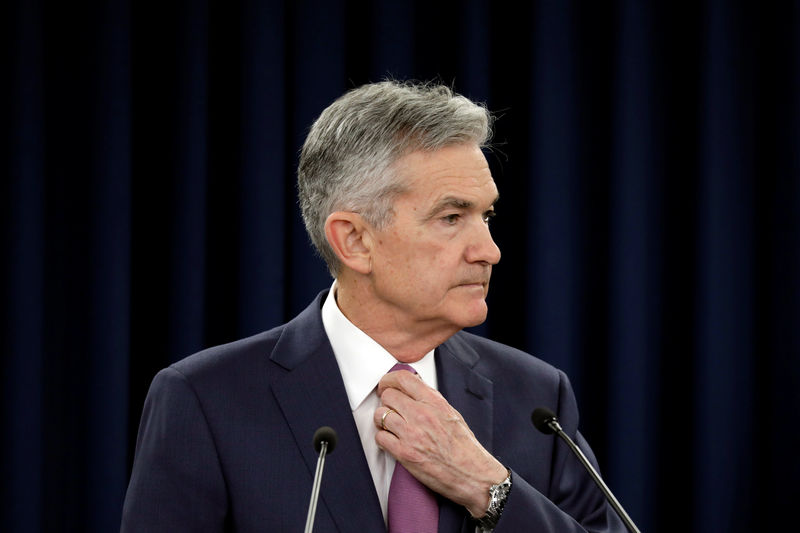By Yasin Ebrahim
Investing.com -- After years of propping up stocks, the Federal Reserve is now faced with the task of piercing the ‘wealth bubble’ to dampen inflation. But deflating the bubble lands the economy in recession likely forcing the market to shed about a fifth of its value.
“We believe that the Fed will land us in a recession,” Phillip Toews, CEO & Portfolio Manager of Toews Asset Management told Investing.com earlier this week. A recession could tip stocks into an “average bear market or worst, with losses of about 35%,” Toews added, pointing to the historical average decline in bear markets.
With markets down about 18% year-to-date, an average bear-market decline suggests stocks potentially risk shedding nearly a fifth of their value in a recession.
The Fed's Finger Prints All Over the Wealth Effect
The more than a decade-long diet of low interest rates and market-friendly monetary policy conditions as well as fiscal stimulus have pumped up the value of assets on consumer balance sheets, leading to a mountain of wealth that encourages spending and feeds inflation.
Growth sectors of the market such as tech, which were in-vogue and frequently made the list of the most overcrowded trades during the equity bull market run, played a big role in the wealth build up for equity investors.
“When we looked at what the vast majority of new clients that came into our wealth management practice, the FANG stocks were a big chunk of their portfolio,” Eric Diton, President and Managing Director at The Wealth Alliance, said in a recent interview with Investing.com.
But growth stocks with higher valuations have become increasingly unattractive in a rising rate environment.
“I've been saying for the last year, you can own tech but not in an S&P 500 style, where five or six stocks make up about 25% of your portfolio. Those people are really getting hurt right now,” Diton added.
Early Signs of Fed Policy Poking at the Wealth Bubble
There are early signs that the Fed’s policy measures are putting the squeeze on consumer wealth.
U.S. household wealth shrank for the first time in two years in the first quarter of 2022, a Federal Reserve report on Thursday showed.
Household net worth slipped to $149.3 trillion from an all-time high of $149.8 trillion at the end of last year, according to the Fed's quarterly snapshot of the national balance sheet.
The decline was driven by a $3 trillion slump in stocks, though rising real estate values, which climbed by another $1.7 trillion in the quarter, kept a lid on losses.
Home prices, which topped 20.6% in March from a year earlier, have continued to surge even as mortgage rates have climbed, according to the latest S&P CoreLogic Case-Shiller Home Price Index.
Deflating the wealth bubble will require a pullback not only in stock prices, but also home prices.
“The Fed supported the markets for about 15 years, but now has an incentive to prick the [wealth] bubble and cause financial asset prices and home prices to deflate as a way of addressing inflation, Toews said.”
Hard Landing or Crash Landing?
Undoing the ‘wealth affect’ or making consumers feel less well-off to discourage spending and bring down inflation will also rely on the Fed’s ability to restore the demand and supply imbalance in the labor market to cool wage growth.
“As long as you have faster wage inflation … the Fed won’t come close to getting anywhere near 2% or 3% inflation,” Chief Strategist at Spouting Rock Asset Management Rhys Williams told Investing.com in an interview on Friday.
While acknowledging the tight labor market is a “tough” issue for the Fed, Williams said there is “potential that in 2023 that the ‘great resignation’ becomes a ‘great application’ as you’re not going to have so many job openings available.”
“That’s already starting to happen … it's concentrated now in blockchain technology and software companies, some internet-based companies but it's going to get broader as the year unfolds,” Williams added.
As consensus toward a recession gather steam, many are debating whether a deep or mild economic slowdown is ahead. For some, the excess household savings built up over the years and lack of major capital expenditure by businesses, will likely prevent a major recession.
“We didn't really have the mother of all capex spending cycles to generate a lot of excess capacity and the consumer is strong,” Williams said. “Those two factors are probably what prevents a major recession.”
